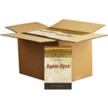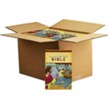1 Chronicles 9-11
Easy-to-Read Version
9 The names of all the Israelites were listed in their family histories. Those family histories were put in the book, The History of the Kings of Israel.
The People in Jerusalem
The people of Judah were made prisoners and forced to go to Babylon. They were taken there because they were not faithful to God. 2 The first people to come back and live in their own lands and towns were some Israelites, priests, Levites, and servants who work in the Temple.
3 These are the people from the tribes of Judah, Benjamin, Ephraim, and Manasseh who lived in Jerusalem:
4 Uthai was Ammihud’s son. Ammihud was Omri’s son. Omri was Imri’s son. Imri was Bani’s son. Bani was a descendant of Perez. Perez was Judah’s son.
5 The Shilonites who lived in Jerusalem were Asaiah the oldest son and his sons.
6 The Zerahites who lived in Jerusalem were Jeuel and their relatives. There were 690 of them in all.
7 These are the people from the tribe of Benjamin who lived in Jerusalem: Sallu was Meshullam’s son. Meshullam was Hodaviah’s son. Hodaviah was Hassenuah’s son. 8 Ibneiah was Jeroham’s son. Elah was Uzzi’s son. Uzzi was Micri’s son. And Meshullam was Shephatiah’s son. Shephatiah was Reuel’s son. Reuel was Ibnijah’s son. 9 The family history of Benjamin shows there were 956 of them living in Jerusalem. All these men were leaders in their families.
10 These are the priests who lived in Jerusalem: Jedaiah, Jehoiarib, Jakin, and 11 Azariah. Azariah was Hilkiah’s son. Hilkiah was Meshullam’s son. Meshullam was Zadok’s son. Zadok was Meraioth’s son. Meraioth was Ahitub’s son. Ahitub was the important official responsible for God’s Temple. 12 Also there was Jeroham’s son, Adaiah. Jeroham was Pashhur’s son. Pashhur was Malkijah’s son. And there was Adiel’s son, Maasai. Adiel was Jahzerah’s son. Jahzerah was Meshullam’s son. Meshullam was Meshillemith’s son. Meshillemith was Immer’s son.
13 There were 1760 priests. They were leaders of their families. They were responsible for the work of serving in God’s Temple.
14 These are the people from the tribe of Levi who lived in Jerusalem: Hasshub’s son, Shemaiah. Hasshub was Azrikam’s son. Azrikam was Hashabiah’s son. Hashabiah was a descendant of Merari. 15 Also living in Jerusalem were Bakbakkar, Heresh, Galal, and Mattaniah. Mattaniah was Mica’s son. Mica was Zicri’s son. Zicri was Asaph’s son. 16 Obadiah was Shemaiah’s son. Shemaiah was Galal’s son. Galal was Jeduthun’s son. Berekiah was Asa’s son. Asa was Elkanah’s son. Berekiah lived in the small towns near the people of Netophah.
17 These are the gatekeepers who lived in Jerusalem: Shallum, Akkub, Talmon, Ahiman, and their relatives. Shallum was their leader. 18 Now these men stand next to the King’s Gate on the east side. They were the gatekeepers from the tribe of Levi. 19 Shallum was Kore’s son. Kore was Ebiasaph’s son. Ebiasaph was Korah’s son. Shallum and his brothers were gatekeepers. They were from the family of Korah. They had the job of guarding the entrance to the Holy Tent. They did this just as their ancestors had done before them. Their ancestors had the job of guarding the entrance to the area where the Lord lived among the people. 20 In the past, Phinehas was in charge of the gatekeepers. Phinehas was Eleazar’s son. The Lord was with Phinehas. 21 Zechariah son of Meshelemiah was the gatekeeper at the entrance to the Holy Tent.
22 In all there were 212 men who were chosen to guard the gates of the Holy Tent. Their names were written in their family histories in their small towns. David and Samuel the seer chose these men because they could be trusted. 23 The gatekeepers and their descendants had the responsibility of guarding the gates of the Lord’s house, the Holy Tent. 24 There were gates on the four sides: east, west, north, and south. 25 The gatekeepers’ relatives who lived in the small towns had to come and help them at certain times. They came and helped the gatekeepers for seven days each time.
26 There were four gatekeepers who were the leaders of all the gatekeepers. They were Levites. They had the job of caring for the rooms and treasures in God’s Temple. 27 They stayed up all night guarding God’s Temple, and they had the job of opening God’s Temple every morning.
28 Some of the gatekeepers had the job of caring for the dishes used in the Temple services. They counted them when they were brought in. They also counted these dishes when they were taken out. 29 Other gatekeepers were chosen to care for the furniture and the special dishes. They also took care of the flour, wine, oil, incense, and special oil.[a] 30 But it was the priests who had the job of mixing the special oil.
31 There was a Levite named Mattithiah who had the job of baking the bread used for the offerings. Mattithiah was Shallum’s oldest son. Shallum was from the Korah family. 32 Some of the gatekeepers who were in the Korah family had the job of preparing the bread put on the table every Sabbath.
33 The Levites who were singers and leaders of their families stayed in the rooms at the Temple. They did not have to do other work because they were responsible for the work in the Temple day and night.
34 All these Levites were leaders of their families. They were listed as leaders in their family histories. They lived in Jerusalem.
The Family History of King Saul
35 Jeiel was Gibeon’s father. Jeiel lived in the town of Gibeon. His wife was named Maacah. 36 Jeiel’s oldest son was Abdon. Other sons were Zur, Kish, Baal, Ner, Nadab, 37 Gedor, Ahio, Zechariah, and Mikloth. 38 Mikloth was Shimeam’s father. Jeiel’s family lived near their relatives in Jerusalem.
39 Ner was Kish’s father. Kish was Saul’s father. And Saul was the father of Jonathan, Malki Shua, Abinadab, and Esh Baal.
40 Jonathan’s son was Merib Baal. Merib Baal was Micah’s father.
41 Micah’s sons were Pithon, Melech, Tahrea, and Ahaz. 42 Ahaz was the father of Jadah.[b] Jadah was the father of Alemeth, Azmaveth, and Zimri. Zimri was Moza’s father. 43 Moza was the father of Binea. Rephaiah was Binea’s son. Eleasah was Rephaiah’s son. And Azel was Eleasah’s son.
44 Azel had six sons. Their names were Azrikam, Bokeru, Ishmael, Sheariah, Obadiah, and Hanan. They were Azel’s children.
The Death of King Saul
10 The Philistines fought against the Israelites. The Israelites ran away from the Philistines. Many Israelites were killed on Mount Gilboa. 2 The Philistines continued chasing Saul and his sons. They caught them and killed them. The Philistines killed Saul’s sons Jonathan, Abinadab, and Malki Shua. 3 The fighting was heavy around Saul. The archers shot Saul with their arrows and wounded him.
4 Then Saul said to the helper who carried his armor, “Pull out your sword and use it to kill me. Then these foreigners[c] will not hurt me and make fun of me when they come.”
But the helper was afraid. He refused to kill Saul. So Saul used his own sword to kill himself by falling on it. 5 When the helper saw that Saul was dead, he also fell on his own sword and died. 6 So Saul and three of his sons died. All of Saul’s family died together.
7 When all the Israelites living in the valley saw that their own army had run away and that Saul and his sons were dead, they left their towns and ran away. Then the Philistines came into the towns and lived in them.
8 The next day, the Philistines came to take valuable things from the dead bodies. They found Saul’s body and the bodies of his sons on Mount Gilboa. 9 The Philistines took things from Saul’s body. They took Saul’s head and armor. They sent messengers through all their country to tell the news to their false gods and to their people. 10 The Philistines put Saul’s armor in the temple of their false gods. They hung Saul’s head in the temple of Dagon.
11 All the people living in the town of Jabesh Gilead heard everything that the Philistines had done to Saul. 12 All the brave men from Jabesh Gilead went to get the bodies of Saul and his sons. They brought them back to Jabesh Gilead. They buried the bones of Saul and his sons under the large tree in Jabesh. Then they showed their sadness and fasted for seven days.
13 Saul died because he was not faithful to the Lord. He did not obey the Lord’s word. Saul also went to a medium and asked her for advice 14 instead of asking the Lord. That is why the Lord killed Saul and gave the kingdom to Jesse’s son David.
David Becomes King Over Israel
11 All the Israelites came to David at the town of Hebron. They said to David, “We are your own flesh and blood.[d] 2 In the past you led us in war. You led us even though Saul was the king. The Lord said to you ‘David, you will be the shepherd of my people, the Israelites. You will become the leader over my people.’”
3 All the leaders of Israel came to King David at the town of Hebron. David made an agreement with them in Hebron before the Lord. The leaders anointed David. That made him king over Israel. The Lord had promised through Samuel that this would happen.
David Captures Jerusalem
4 David and all the Israelites went to the city of Jerusalem. Jerusalem was called Jebus at that time. The people living in that city were named Jebusites. They 5 said to David, “You cannot get inside our city.” But David did defeat them. He took over the fortress of Zion, and it became the City of David.
6 David said, “The one who leads the attack on the Jebusites will become the commander over all my army.” So Joab led the attack. He was Zeruiah’s son. Joab became the commander of the army.
7 Then David made his home in the fortress. That is why it is named the City of David. 8 David built the city around the fort. He built it from the Millo to the wall around the city. Joab repaired the other parts of the city. 9 David continued to grow greater, and the Lord All-Powerful was with him.
The Three Heroes
10 This is a list of the leaders over David’s special soldiers. These heroes became very powerful with David in his kingdom. They and all the Israelites supported David and made him king, just as the Lord had promised.
11 This is a list of David’s special soldiers:
Jashobeam the Hacmonite[e] was the leader of the king’s special forces.[f] Jashobeam used his spear to kill 300 men at one time.
12 Next there was Eleazar son of Dodai[g] from Ahoah. Eleazar was one of the Three Heroes.[h] 13 Eleazar was with David at Pasdammim. The Philistines had come to that place to fight a war. There was a field full of barley there. The Israelites ran away from the Philistines. 14 But the Three Heroes stood there in that field and defended it. They defeated the Philistines. The Lord gave the Israelites a great victory.
15 Once David was at the cave of Adullam, and three of the Thirty Heroes[i] went down to meet him by a rock near the cave. At the same time the Philistine army was camped in the Valley of Rephaim.
16 Another time David was in the fortress, and a group of Philistine soldiers was stationed in Bethlehem. 17 David was thirsty for some water from his hometown, so he said, “Oh, if only I could have some water from that well by the gate in Bethlehem.” 18 So the Three Heroes[j] fought their way through the Philistine army and got some water from the well near the city gate in Bethlehem. They took it to David, but he refused to drink it. He poured it on the ground as an offering to the Lord. 19 David said, “God, I cannot drink this water. It would be like drinking the blood of the men who risked their lives to get this water for me.” That is why David refused to drink the water. The Three Heroes did many brave things like that.
Other Brave Soldiers
20 Joab’s brother, Abishai, was the leader of the Three Heroes. Abishai used his spear against 300 enemies and killed them. He was as famous as the Three Heroes. 21 Abishai was even more famous than the Three Heroes.[k] He became their leader, even though he was not one of the Three Heroes.
22 Then there was Benaiah son of Jehoiada, from Kabzeel. He was the son of a powerful man.[l] Benaiah did many brave things. He killed two of the best soldiers in Moab. One day when it was snowing, Benaiah went down into a hole in the ground and killed a lion. 23 And Benaiah killed a big Egyptian soldier. That man was about 7 1/2 feet[m] tall. The Egyptian had a spear that was very large and heavy. It was as big as the pole on a weaver’s loom. Benaiah had only a club. He grabbed the spear in the Egyptian’s hands and took it away from him. Then Benaiah killed the Egyptian with his own spear. 24 Benaiah son of Jehoiada did many brave things like that. He was as famous as the Three Heroes. 25 Benaiah was even more famous than the Thirty Heroes, but he was not one of the Three Heroes. David made Benaiah the leader of his bodyguards.
The Thirty Heroes
26 The following men were among the king’s special forces:
Asahel, Joab’s brother;
Elhanan son of Dodai from Bethlehem;
27 Shammoth the Harodite;
Helez the Pelonite;
28 Ira son of Ikkesh from Tekoa;
Abiezer from Anathoth;
29 Sibbecai the Hushathite;
Ilai from Ahoah;
30 Maharai from Netophah;
Heled son of Baanah from Netophah;
31 Ithai son of Ribai from Gibeah in Benjamin;
Benaiah the Pirathonite;
32 Hurai from the Brooks of Gaash;
Abiel the Arbathite;
33 Azmaveth the Baharumite;
Eliahba the Shaalbonite;
34 the sons of Hashem the Gizonite;
Jonathan son of Shagee the Hararite;
35 Ahiam son of Sacar the Hararite;
Eliphal son of Ur;
36 Hepher the Mekerathite;
Ahijah the Pelonite;
37 Hezro the Carmelite;
Naarai son of Ezbai;
38 Joel, Nathan’s brother;
Mibhar son of Hagri;
39 Zelek the Ammonite;
Naharai the officer from Beeroth, who carried the armor for Joab son of Zeruiah;
40 Ira the Ithrite;
Gareb the Ithrite;
41 Uriah the Hittite;
Zabad son of Ahlai;
42 Adina who was the son of Shiza from the tribe of Reuben and was the leader of the tribe and one of the Thirty Heroes;
43 Hanan son of Maacah;
Joshaphat the Mithnite;
44 Uzzia the Ashterathite;
Shama and Jeiel sons of Hotham from Aroer;
45 Jediael son of Shimri
and his brother Joha the Tizite;
46 Eliel the Mahavite;
Jeribai and Joshaviah the sons of Elnaam;
Ithmah the Moabite;
47 Eliel; Obed; and Jaasiel the Mezobaite.
Footnotes
- 1 Chronicles 9:29 special oil Or “perfume.” This might be the oil used to anoint priests, prophets, and kings. See Ex. 30:22-38.
- 1 Chronicles 9:42 Jadah This is from the ancient Greek translation and some Hebrew copies. Most Hebrew copies have “Jarah” for “Jadah” in this verse.
- 1 Chronicles 10:4 foreigners Literally, “uncircumcised.” This means people who did not share in the agreement God made with Israel. See “circumcise, circumcision” in the Word List.
- 1 Chronicles 11:1 We are … blood A way of saying they were David’s relatives.
- 1 Chronicles 11:11 Jashobeam the Hacmonite This is “Josheb Basshebeth the Tahkemonite” in 2 Sam. 23:8.
- 1 Chronicles 11:11 king’s special forces A special group of soldiers who formed three-man squads and went on special missions for the king.
- 1 Chronicles 11:12 Eleazar son of Dodai Or “Eleazar his cousin.”
- 1 Chronicles 11:12 Three Heroes These were David’s three bravest soldiers. Also in verses 18, 20, 24.
- 1 Chronicles 11:15 Thirty Heroes Or “the king’s special forces.” These men were David’s famous group of very brave soldiers. Also in verses 25, 42.
- 1 Chronicles 11:18 Three Heroes These were David’s three bravest soldiers. Also in verses 19-21.
- 1 Chronicles 11:21 Three Heroes Or possibly, “The Thirty Heroes.”
- 1 Chronicles 11:22 powerful man That is, a man from the warrior class ready to protect his people in war.
- 1 Chronicles 11:23 about 7 1/2 feet Literally, “5 short cubits” (2.22 m).
Copyright © 2006 by Bible League International
Bible Gateway Recommends





